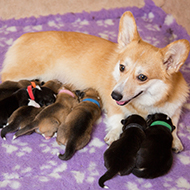A quarter of puppies rehomed before recommended age

Eight per cent of puppies in the study were acquired without being seen with their mothers.
New research by Dogs Trust has revealed that one-quarter of puppies were rehomed before the recommended minimum age.
Early findings from the pioneering 'Generation Pup' study show that 25 per cent of dog owners got their puppies before eight weeks of age, despite advice that puppies should not leave their mothers before this time.
Furthermore, the findings also reveal that eight per cent of puppies in the study were acquired without being seen with their mothers. The results have been published this week in the journal, Vet Record.
Dr Rachel Casey, Dogs Trust’s director of canine behaviour and research, said: “The recommendation that puppies spend at least eight weeks with their mothers before going off to their new homes is not always followed, as has been shown in this study.
"Through the Generation Pup study, we can investigate the impact that a range of factors including acquisition before eight weeks of age has on the long-term development of puppies.”
She added: “Generation Pup is providing us with huge insights into the early stages of life for puppies and will help us understand how to better advise people who want to get a puppy responsibly and make the best decisions for their long term health and behaviour.”
Generation Pup is a groundbreaking study that follows a generation of puppies throughout their lifetime, investigating factors such as how environment, social interaction, diet and exercise can impact their development in later life. Researchers hope the results will inform preventative measures that can be put in place or lead to new therapies and treatments for dogs.
Professor Toby Knowles, from Bristol Veterinary School and a member of the Generation Pup team, said “We’re excited to be able to work with Dogs Trust as part of this ground-breaking study. These are the first of many more insightful findings that we hope will be revealed from Generation Pup.”
Dogs Trust is seeking more puppy owners to get involved in the study. If you have a puppy or are soon to get one, visit the Generation Pup website for more details.



 The veterinary mental health charity Vetlife is inviting the veterinary community to join it for a sponsored cold-water dip.
The veterinary mental health charity Vetlife is inviting the veterinary community to join it for a sponsored cold-water dip.